Making and receiving impact in Nepal
28 Oct 2022|Alexander Nowak
- Library, Arts & Archives
- Research
On a bus ride from Kathmandu centre to the outskirts of Lalitpur, I commented to a fellow project volunteer:
‘Culture shock? I’m not sure how relevant that is anymore. Pre-globalization, pre-mass immigration… pre-internet, pre-television… sure, but today? We have a much better idea how others live, can one really be shocked anymore?’
I could not have been more wrong.
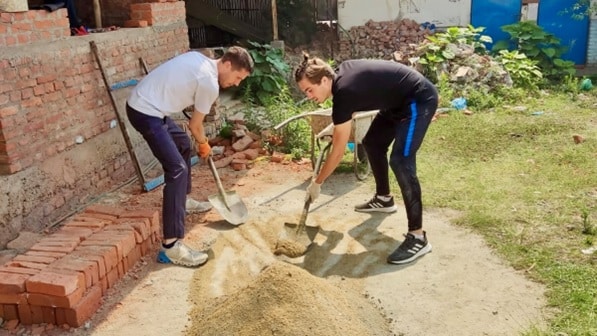
Describing the indescribable
Having grown up in Canada, I’ve been lucky to live most of my life in a country without fear of the most devastating natural disasters of earthquakes, hurricanes, and tsunamis, and when ‘lesser’ forms of disaster hit, having the means to mitigate and manage their impact.
The 2015 Nepali earthquake, meanwhile, left an already struggling country in literal tatters. It left the students of the New Modern English Academy (NMEA), a ‘community school’ (not being publicly funded or charging tuition), without a place to study.
Roadside debris, semi-standing buildings, shut down shops… these are things you expect to see in the weeks, maybe months, post-disaster, not approaching a decade later. Then there are the stories… the stories of loved ones lost, clearly visible physical and emotional trauma lingering amongst the young and old… there are no words.
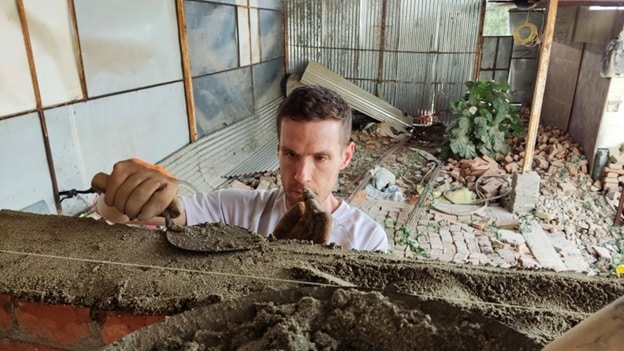
Living up to expectations
When I considered projects in my application for the Matt Greenwood Travel Scholarship, I worried I might not fully embrace Matt’s gifts of adventure, courage, and concern for others.
Adventurous? The conditions and challenges that await in a such a different culture, standard of living, and the unique challenges that come with building and construction in remote areas seemed to fit but were hardly akin to trekking deep into the heart of the Amazon.
Courageous? As privileged first-world inhabitants, embracing more opportunities to break out of our comforts and share our splendors, be they material, knowledge, or laborious, with all people, seemed far more a case of ‘doing our duty’ as global citizens than of being truly courageous.
Concern for others? Certainly the sooner the students of the NMEA can regain full facility access would be supportive and a show of concern, but what if my inexperience in building slows the project down or requires reworking? Is that a genuine act of concern for others or a mere self-indulgence?
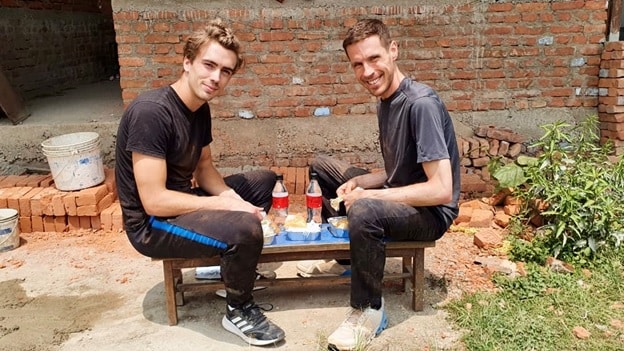
Good purpose
While I still maintain I did not live up to the standards of Matt’s gifts, I can safely say I’ve put those worries to rest, with one caveat: any deficiencies in such were made up for with the award’s aim of delivery of good purpose. Given the myriad of positive changes an educated youth can bring forward for decades to come, no other project I could have engaged in would have measured similarly in delivering impact. While most of the work was laborious, from never-ending cycles of mixing cement and laying bricks, the reactions by the children in every interaction drove home how meaningful even modest efforts can be. Particularly, I relished in the enthusiasm with which students asked questions about my travels and life in the UK and Canada. So heart-warming was seeing the students step out of their shells in the final afternoon session and engage with both answers and smiles to my class queries.
Tangentially, I’m not sure which reaction will stay with me longer: the jaw-drops when I explained how the time it takes to cross the Atlantic Ocean is the same as at it takes to get from one end of Canada to the other or the eruption of exuberance when I told them my favourite Nepali food were chicken momos?
On second thought, no, I’m sure: it’s the latter.
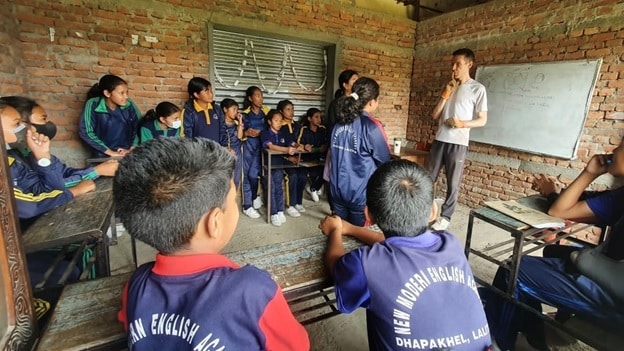
Making the most of it all
Most of our travels are business or leisure. Running to and from conferences and venues and staying in fancy hotels, or using our allotted vacation times to engage in those activities and comforts most enjoyable to us.
Staying with a host family and living the life of a local, however, is an unmatchable experience when it comes to full cultural integration. It also brings forward completely unexpected discoveries.
Would I have expected to stay with a family whose mother was a bit of TikTok sensation? Could I have envisioned spending evenings helping a pre-teen study for her high school qualification exams (and preferring to do that over visiting countless incredible temples)? Would I have thought I’d overcome the awkwardness of being watched over by the cook of our meals (a standard practice to ensure all is to our liking and being on the ready to refill our plates with dahl batt and rice)?
While visiting Everest basecamp or going on a weeklong trek in Pokhara would have made for amazing memories and stories, I am much happier that I got to know people, and a people, at a deeper level; the opportunity to make these connections has already proven far more impactful and resonant.
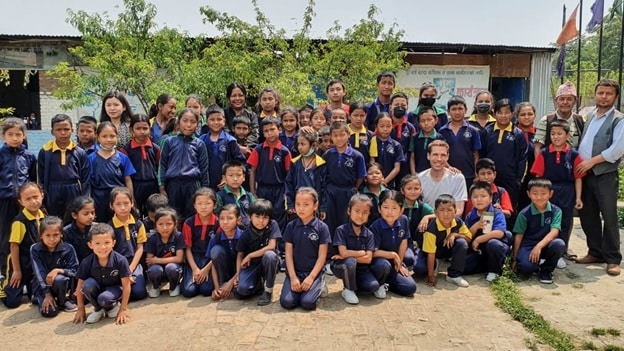
Culture shock, you say?
Seven years after the destruction wrought by the Nepali earthquake, it is clear in so many ways how it is still a part of the daily lived experience of the entire nation. Lacking sustained international aide past the initial buzz brought by its headlines, it’s wild to think NMEA is like so many other institutions in only recently passing the mid-point in rebuilding their facilities, if that.
Back home, writing this in the comforts of my accommodations at Teddy Hall, I am ever so grateful to the wonderous gifts this experience rewarded me with. Witnessing firsthand the ingenuity, resilience, and hope of a people who have suffered so deeply? This was truly shocking… and even further inspiring.
Thank you, a hundred times over, to St. Edmund Hall and the purveyors of the Matt Greenwood Travel Scholarship. For one modest Teddy Haller and (hopefully!) one Nepali community, your gifts will undoubtably last a lifetime.
Categories: Library, Arts & Archives Research
Author
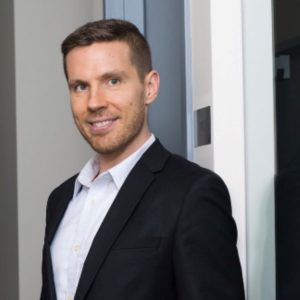
Alexander
Nowak
Alexander is an MSc student in Major Programme Management at Saïd Business School matriculating in 2021. An HEC Montréal-Saïd Business School Scholar, he completed double BAs (Political Science Honours & Psychology Major: Concordia University) and an MBA (HEC Montréal) before joining the University of Oxford, a choice fueled by his drive to lead major educational initiatives that make transformative impacts across society.